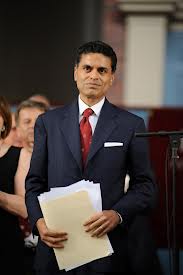 New York, August 11: Time editor-at-large and CNN host Fareed Zakaria has been suspended by both the magazine and the network for lifting several paragraphs by another writer for his use in a recent Time column.
New York, August 11: Time editor-at-large and CNN host Fareed Zakaria has been suspended by both the magazine and the network for lifting several paragraphs by another writer for his use in a recent Time column.
Zakaria apologized Friday, declaring in a statement he made "a terrible mistake," adding, "It is a serious lapse and one that is entirely my fault."
In a separate statement, Time spokesman Ali Zelenko said the magazine accepts Zakaria's apology, but would suspend his column for one month, "pending further review."
"What he did violates our own standards for our columnists, which is that their work must not only be factual but original; their views must not only be their own but their words as well," Zelenko said.
Shortly afterward, CNN said it had removed from the network's website a blog post that "included similar unattributed excerpts," and taken Zakaria off the air indefinitely.
"CNN has suspended Fareed Zakaria while this matter is under review," said CNN spokeswoman Jennifer Dargan. She said Zakaria's Sunday foreign-affairs program, "GPS," will have its time slots filled in the interim by "Your Money with Ali Veshi" and "The Situation Room with Wolf Blitzer."
Earlier Friday, media reporters had called attention to similarities between passages in Zakaria's column about gun control that appeared in Time's Aug. 20 issue, and paragraphs from an article on the same subject by Harvard University history professor Jill Lepore published in April in The New Yorker magazine.
In Zakaria's column, titled "The Case for Gun Control," he began one paragraph with the sentences: "Adam Winkler, a professor of constitutional law at UCLA, documents the actual history in 'Gunfight: The Battle Over the Right to Bear Arms in America.' Guns were regulated in the U.S. from the earliest years of the Republic."
A corresponding passage in Lenore's New Yorker essay, titled "Battleground America," begins: "As Adam Winkler, a constitutional-law scholar at U.C.L.A., demonstrates in a remarkably nuanced new book, 'Gunfight: The Battle Over the Right to Bear Arms in America,' firearms have been regulated in the United States from the start."
In Zakaria's statement, he apologized "unreservedly" to Lepore, as well as to his editors and readers.






Comments
Add new comment